Politics
Biden and Trump head to border for high-stakes duel

Joe Biden and Donald Trump will both travel to the US-Mexico border on Thursday, locked in a high-stakes political duel on an issue that could ultimately decide the US presidential election.
That border was crossed last year by 2.5 million undocumented migrants, an influx that has overwhelmed processing facilities and pushed social services in major American cities to the brink.
The day provides an opportunity for Mr Biden to try to convince voters he is serious about immigration, while Mr Trump’s own trip is yet another chance to shine a spotlight on an issue that has been the central focus of his political career.
November’s general election is expected to be a Biden-Trump rematch, although the two candidates have not secured their respective parties’ nomination quite yet.
Mr Trump is visiting Eagle Pass, the Texas border town where Republican Governor Greg Abbott has defied the Biden White House by using state National Guard soldiers to detain undocumented migrants and erect border barricades, including razor-wire fences that critics say are inhumane.
The former president is likely to tout these kind of aggressive measures and cite them as part of the reason why border crossings have dropped in Texas recently, while spiking in Arizona and California – states with Democratic governors.
The White House only announced Mr Biden’s own visit to Brownsville, Texas, a few days ago and the president’s trip is another indication that Democrats are scrambling to respond to an area of perceived weakness.
More than 6.3 million migrants have been detained crossing into the US illegally during Mr Biden’s time in office – a higher number than under previous presidencies – though experts say the reasons for the spike are complex, with some factors pre-dating his government.
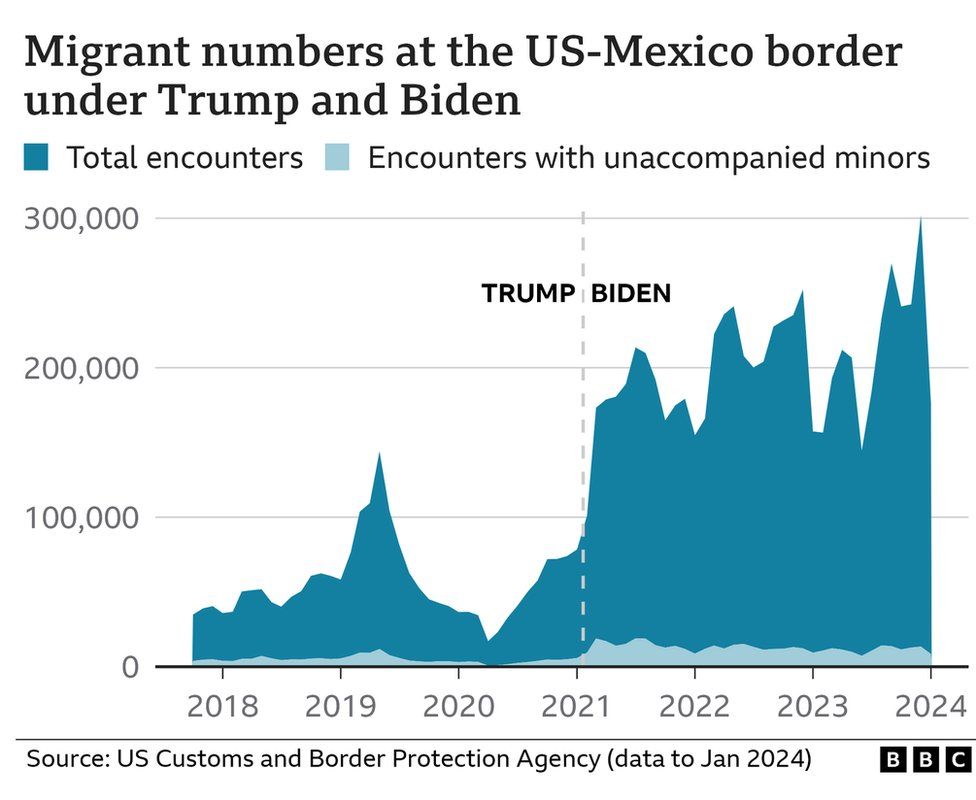
“He needs to get down there, show his face, and get the pulse of what’s happening,” says Jaime Dominguez, a professor of politics at Northwestern University. Mr Biden has been criticised for failing to engage on this issue until now, he notes, and “perception is reality”.
That perception is translating into public opinion polls that paint a dark picture for the president. According to a recent Gallup survey, 28% of Americans named immigration as their top concern, beating out every other topic, including the economy and inflation. A Harris poll found Mr Biden’s approval rating on the issue at 35% – his lowest issue rating.
Some 61% of Americans in a Monmouth survey listed illegal immigration as a “very serious problem”, with a majority of respondents for the first time saying they support Mr Trump’s proposal of building a US-Mexico border wall.
Leaders in major Democrat-run US cities have grown increasingly critical of the president’s immigration policies – a consequence of the hundreds of thousands of migrants who have arrived in places like Chicago, Los Angeles and New York either on their own or with transportation arranged by Republican governors in states like Texas.
“Very progressive mayors are having to grapple with this issue, and they’re pleading with the federal government to do something,” Prof Dominguez says. “This isn’t an issue Democrats can just hide behind and say that it’s OK.”
Mr Biden’s border visit, the second of his presidency, appears part of a concerted effort to reverse this trend and turn the tables on Republicans – or at least minimise the political damage – allowing the election outcome to hinge on other topics, such as the economy or abortion rights.
The Biden camp has been hitting Mr Trump and congressional Republicans for blocking Senate-passed bipartisan immigration reform legislation in the House of Representatives earlier this month. They cite claims by the former president that he wanted to deny Mr Biden a victory on border security as evidence that Republicans are not serious about addressing the issue.
“Democrats called the bluff of the Republicans who for 30 years have said we need border security,” says Douglas Rivlin, senior communications director for the pro-immigration group America’s Voice. “They walked away because they’re not interested in actually resolving these issues, they’re interested in demonising immigrants because they see that as an important political strategy.”
Mr Rivlin notes that Republicans tried to capitalise on immigration fears in recent national elections – including 2018, 2020 and 2022 – with minimal success.
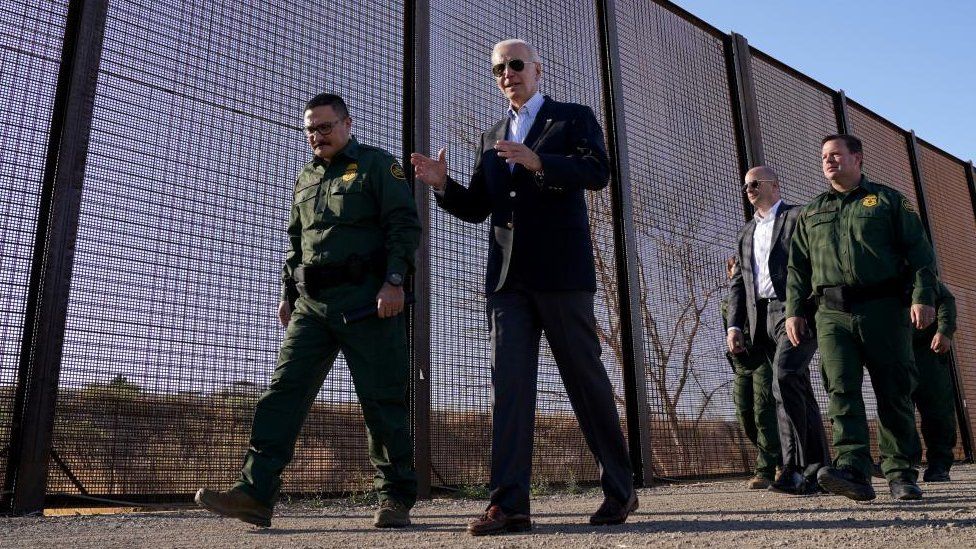
Another prong of the White House’s pivot on immigration may be tougher border measures and more stringent asylum policies that the administration has hinted the president could announce in the coming days. Such steps would be an effort to blunt the criticism that the administration has not done enough over the past three years to address what the president himself recently called a “crisis”.
But this risks alienating pro-immigration elements of Mr Biden’s political base, which could further fracture a electoral coalition that is already strained because of the president’s support of Israel in its war in Gaza.
“If we’re just talking about the border, and using that as a backdrop for the president’s speech, and if he’s a just adopting Trump talking points, it’s not going to work for the president,” Mr Rivlin says. “He has a potential to anger people in his own base without really persuading anybody that he’s as tough as any Republican on the border.”
Meanwhile, Mr Trump and the Republicans are pressing their perceived advantage. They criticise Mr Biden’s efforts as too little, too late, they deride his border visit as a copycat move, and they say the bipartisan congressional reform package that Democrats supported would have been ineffective at best.
“Conscious, deliberate choices made by the Biden administration created what’s going on down at the border right now, and the Biden administration is having to deal with the consequences of it,” says Eric Ruark, director of research for NumbersUSA, a group advocating for lower immigration levels.
He says the Obama administration faced a similar surge in migrants and changed course. With Mr Biden, there was no one in the White House to “put the brakes on” until recently, as the general election campaign loomed.
“At some point, they realised that they have to at least give the impression that they’re changing course,” he says. “Whether they can sell that is the big question.”
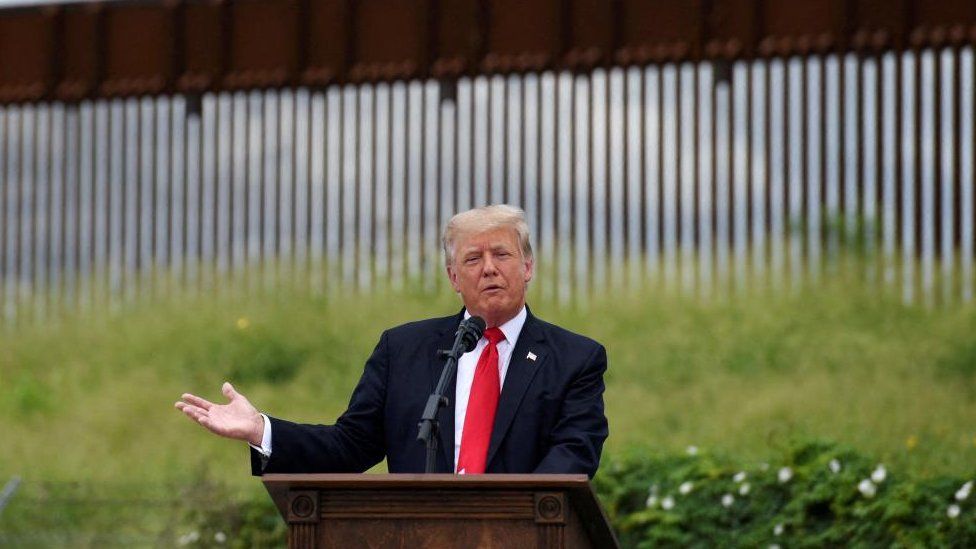
Mr Trump has his own immigration message to sell, and it is one that has its own set of weaknesses. When he was president, his early restrictions on immigration from majority-Muslim countries – an attempt at implementing his so-called “Muslim ban” campaign promise – created chaos at US airports and became mired in months of legal battles.
A 2018 policy of separating children and parents in families detained at the border was roundly denounced as cruel – and led Mr Trump to reverse course.
Now the former president is promising that if he is re-elected he will initiate an even more intense effort to combat undocumented migration, including enforcement efforts throughout the US and massive detention camps on the border.
Mr Rivlin calls that right-wing extremism which the Biden campaign should target for attack.
“Trump is talking about massive roundups and deportations,” he says. “That doesn’t really address where most Americans are. Most Americans want a secure border, but they also think that legal immigration is a good thing.”
Thursday’s Texas trips are just the beginning of what promises to be a pitched general election debate over immigration policy. There is still time for the political ground to shift, but given the state of public opinion, Mr Trump starts the fight with a clear advantage.
“There are steps to take that could do a lot to stem the flow right now,” says Mr Ruark. “But the issue is we’ve got millions of people who are already in the country. It took three years to get here, and you’re not going to solve it before the election.”
© BBC News
Current Affairs
New survey points to coalition-led SA, but voter apathy a major factor
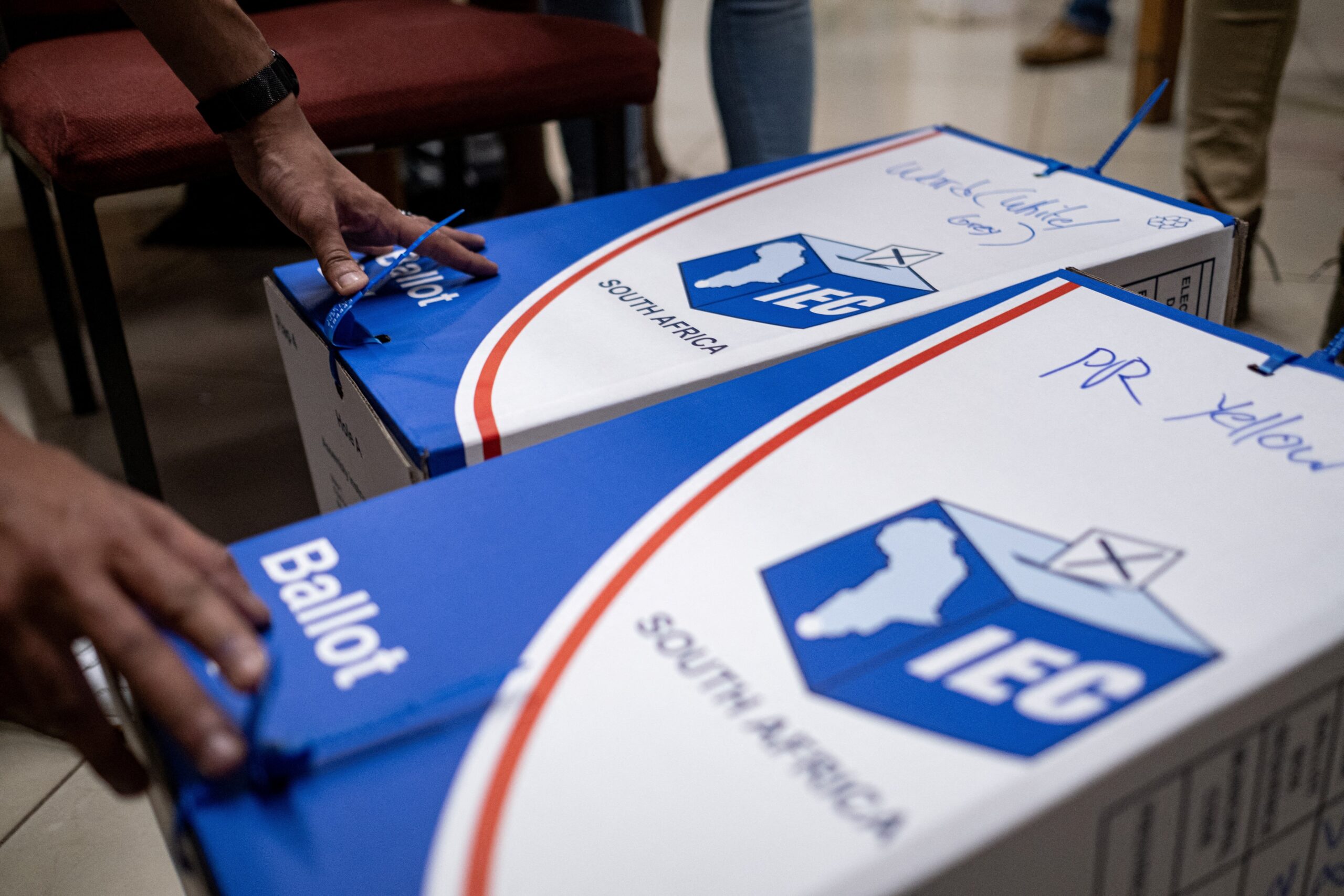
The results of an in-depth survey conducted by African Innovation Research SA (AIRSA) point to the country’s future being in the hands of coalitions and raise concerns about voter apathy, especially among the youth.
The initial sample comprised some 5 000 participants, of whom 46% confirmed they were either not interested in voting despite being registered or had not registered.
The majority of those surveyed by the independent research company based in Cape Town were in the 18–35 age group, a generation who are increasingly disillusioned with how the country is run.
The remaining 2 700 participants, who were interviewed from across a broad section of South Africa’s nine provinces, indicated that support for the ruling ANC is in decline, dipping below the 50% mark to 43% overall.
The ANC’s strongholds remain the Eastern Cape (61% of those surveyed), 58% in the Free State and 65% in Limpopo, where its challenger is the EFF at 23.7%.
In the country’s fourth-largest economy, Mpumalanga, the ANC leads with 52.3%, the EFF at 21.7% and the DA at 19.7%.
In the North West province, it’s a similar pattern, albeit reversed, with the ANC at 48.3%, the DA at 27.7% and the EFF at 20.0%, while in the Northern Cape, the ANC leads with 47.3%, followed by the DA with 24.3% and the EFF with 15.7%.
The country’s economic engine, Gauteng, is a key player in the power dynamics. Here, the ANC garnered 38.7%, but the EFF is growing its base to 19.3%, challenging the DA’s 20% of the province’s voters.
In the Western Cape, as expected, the DA holds onto a leading margin at 46.0%, with the ANC and EFF at 22.3% and 8.7% respectively. Gayton McKenzie’s Patriotic Alliance (PA) also features in the country’s southernmost province, making a notable showing at 5%.
While former president Jacob Zuma may have been barred from becoming a member of Parliament in the Constitutional Court this week, the new uMkhonto weSizwe Party (MKP) will play a pivotal role in KwaZulu-Natal. Results of the AIRSA survey show that while the ANC currently remains ahead with 28.7%, it’s an even race in the province with similar support for the IFP at 26.0% and MKP at 26.7%.
As experience dictates, the smaller parties will begin a series of bargaining tactics as to whose deck they end up in and call the shots.
At collectively accounting for around 20% of the upcoming vote, these potential coalition partners carry significant influence.
AIRSA also noted that voting in this sector is personality-driven as opposed to ideology.
The fragmentation of South Africa’s political landscape could also contribute to increasing dissatisfaction and disillusionment, particularly when linked to the country’s youth and increasing unemployment.
© IOL (Cape Times)
Politics
Zuma lashes out at judges after election ban
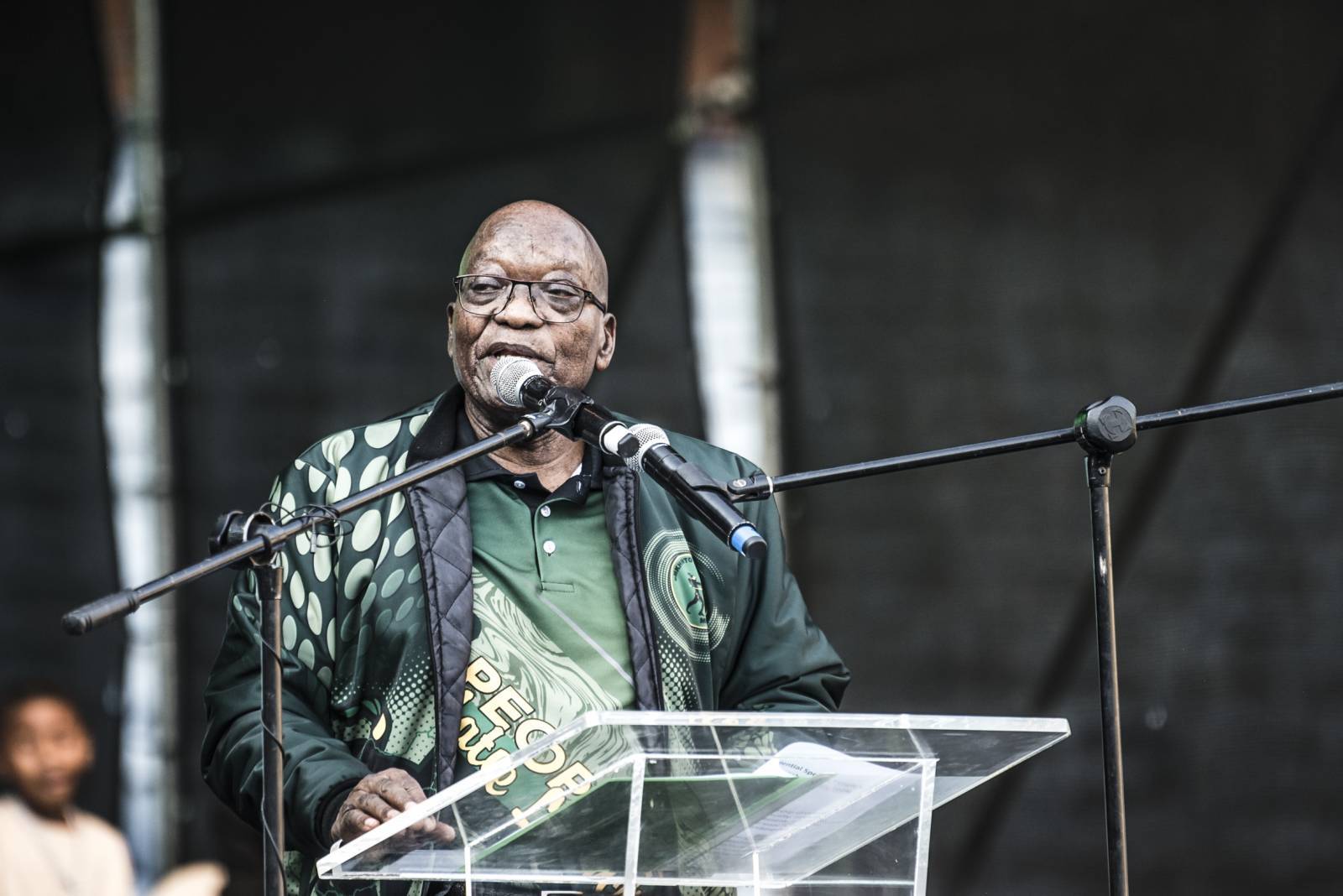
Former President Jacob Zuma has launched a scathing attack on some of the country’s top judges after he was barred from running for parliament on Monday.
In his first interview since the ban, Zuma told the BBC the Constitutional Court was wrong to decide he was unfit to run, based on his 2021 conviction for contempt of court.
“I expected that from our judges, but they are definitely wrong. Not correct,” the 82-year-old said, adding that the constitution should be changed.
Ahead of next week’s general election, Zuma had been campaigning under the banner of the newly formed uMkhonto weSizwe (MK) party.
He joined the party after falling out with the governing African National Congress (ANC), which he used to lead.
The electoral commission argued that the constitution bars anyone who was sentenced to more than 12 months in prison from serving as a lawmaker – a view backed by the Constitutional Court judges.
Zuma was convicted in 2021 for refusing to testify at an inquiry investigating corruption during his presidency.
His lawyers had insisted he was entitled to become an MP as his sentence was reduced to three months after current President Cyril Ramaphosa released him from prison in what was widely seen as an attempt to placate the former president’s angry supporters.
“The judges of the Constitutional Court have acted very funny to me – towards me in particular,” Zuma told the BBC.
“They are not taking into account the will of the people of this country, they use their own will.”
He was president from 2009 to 2018 before being forced out as leader of the ANC amid allegations of widespread corruption in his government.
The corruption, widely known as “State Capture”, saw hundreds of millions of rands of public assets taken into private hands. Zuma has always denied any direct role in corruption, but is due to face trial next year on allegations of bribery.
He told the BBC he had been wrongly stripped of his role as leader of the ANC.
“I don’t know what ‘State Capture’ means. If people say I am corrupt, what did I do? Do you have any facts about it? Am I guilty?
“I was removed before the end of my term, and nothing was produced as evidence that this was an issue.”
Zuma’s MK party had previously voiced its desire to change South Africa’s constitution, which was drawn up 30 years ago at the birth of the country’s democracy following decades of white-minority rule.
Asked about this in the light of his election ban, Zuma reiterated that the historic document needed to be changed.
“This constitution in the continent of Africa is guided by the laws from Europe, not us,” he said.
“There is nothing that has come right in this continent because we are still dominated by those who were the ones [who] slaved us, and after slavery, oppressed us, and after oppression, put their own laws to run us.
“There are details that clash with our lives.”
An Ipsos opinion poll released last month gave MK 8% of the vote, and the ANC 40% as it loses support to MK and other opposition parties.
But some analysts suggest that with the governing party stepping up its campaign in recent weeks, it could still cross the 50% mark. But if the ANC gets less than half of the vote, it would lose its majority for the first time in 30 years.
MK is expected to do especially well in Zuma’s home region of KwaZulu-Natal. Some opinion polls suggest it could emerge as the biggest party in KwaZulu-Natal, ending ANC dominance of the region.
After Zuma was jailed for contempt of court in 2021, angry supporters sparked days of deadly riots. More than 300 people were killed in the clashes.
On Wednesday Zuma said this violence demonstrated the scale of public support for him.
“This must tell you that the masses of this country loves Zuma – that’s why we had that,” he said.
When asked by the BBC if he would use this interview to call for peace and calm ahead of next week’s election, Zuma replied: “I’ve always done so.”
© BBC News
Current Affairs
Iran’s supreme leader leads prayers at Raisi funeral
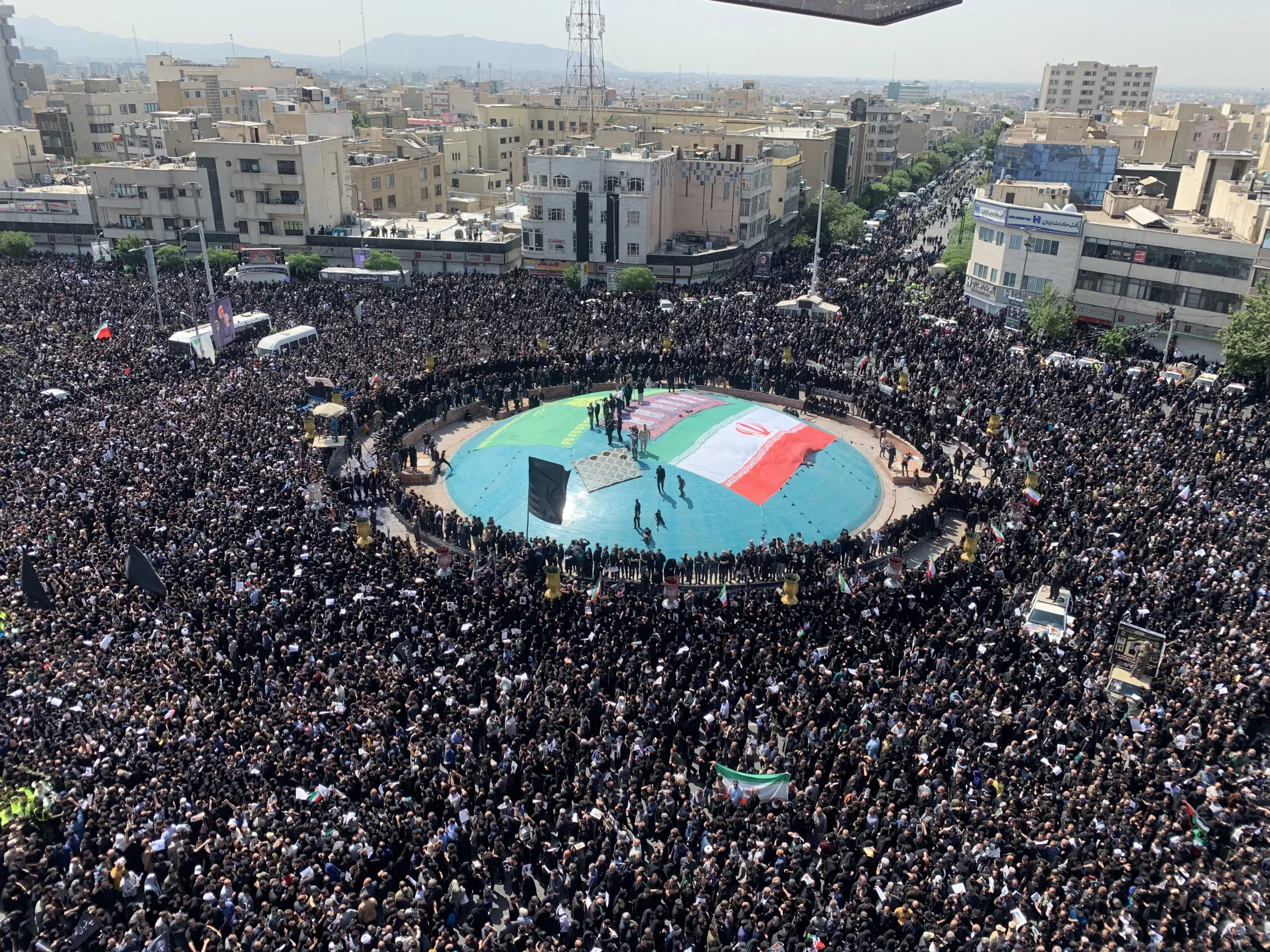
Iran’s supreme leader has presided over a funeral for the country’s late president, foreign minister and others killed in a helicopter crash on Sunday.
Ayatollah Ali Khamenei led prayers at Tehran University, where caskets carrying the dead were draped in Iranian flags.
President Ebrahim Raisi died alongside Foreign Minister Hossein Amir-Abdollahian and six others in a helicopter crash near the border with Azerbaijan.
Authorities had warned against demonstrations against the funeral procession and insults posted online.
“Oh Allah, we didn’t see anything but good from him,” Ayatollah Khamenei said in the standard prayer for the dead in Arabic.
Iran’s acting president, Mohammad Mokhber, stood nearby and openly wept during the service.
People then carried the coffins out on their shoulders, with chants of “Death to America” heard outside.
They loaded them onto a trailer for a procession through downtown Tehran to Azadi Square, where Raisi gave speeches in the past.
In attendance were top leaders of Iran’s paramilitary Revolutionary Guard, one of the country’s major power centres.
Also on hand was Ismail Haniyeh of Hamas, the militant group that Iran has armed and supported during the ongoing Israel-Hamas war.
Haniyeh is widely considered Hamas’s overall leader and has been a prominent member of the movement since 1980. The US Department of State designated him a terrorist in 2018.
“I come in the name of the Palestinian people, in the name of the resistance factions of Gaza…to express our condolences,” Haniyeh said.
He also described meeting Raisi in Tehran during Ramadan, the holy Muslim fasting month.
He said he heard the president say that “the Palestinian issue” remains the key one of the Muslim world, which “must fulfil their obligations to the Palestinians to liberate their land”.
He also claimed that Raisi called Hamas’ October 7 attack in Israel, which saw 1,200 people killed and 250 others taken hostage, an “earthquake in the heart of the Zionist entity”.
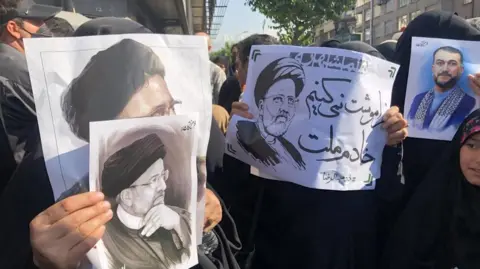
Also expected to attend services in Tehran were Pakistan’s Prime Minister Shehbaz Sharif and a delegation from the Taliban of Afghanistan, which included their Foreign Minister Amir Khan Mutaqqi.
Iran’s theocracy declared five days of mourning over Sunday’s crash, encouraging people to attend the public mourning sessions.
Typically, government employees and schoolchildren attend such events en masse, while others take part out of patriotism, curiosity or to witness historic events.
For Iran’s Shiite theocracy, mass demonstrations have been crucial to demonstrating the legitimacy of their leadership since millions thronged the streets of Tehran to welcome Grand Ayatollah Ruhollah Khomeini in 1979 during the Islamic Revolution, and also attended his funeral 10 years later.
An estimated one million turned out in 2020 for processions for the late Revolutionary Guard General Qasem Soleimani, who was killed in a US drone strike in Baghdad.
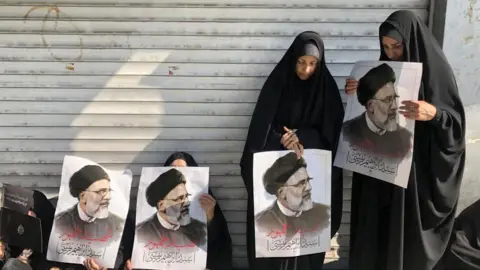
Across the capital, large banners were raised hailing Raisi as “the martyr of service”, while others bade “farewell to the servant of the disadvantaged”.
Some residents in Tehran received texts urging them to attend Wednesday’s ceremonies, the AFP news agency reported.
Footage carried by state TV showed streets filled with mourners, many of whom were carrying pictures of Raisi or the Iranian flag.
Funeral rites for the men began on Tuesday in the city of Tabriz and the Shiite clerical centre of Qom, where thousands of mourners attended ceremonies.
After Wednesday’s procession in the capital, Raisi’s remains will be moved to South Khorasan province, before being transferred to his home city of Mashhad in the northeast.
He will then be buried on Thursday evening in the city after funeral rites at the Imam Reza shrine.
Raisi, a hardline cleric, was a highly divisive figure in Iran. In the 1980s, he oversaw the execution of scores of opposition activists while working as a prosecutor.
He unleashed a brutal crackdown against demonstrators angered by the killing of 22-year-old Mahsa Amini in 2022. She died three days after she was detained by morality police in the capital for allegedly violating Iran’s strict rules requiring women to cover their hair with a hijab, or headscarf.
But his ultra-conservative outlook won favour with supporters of the regime, and Raisi was viewed as a possible successor to Ayatollah Khamenei.
© BBC News
Politics
Ireland to recognise Palestinian state
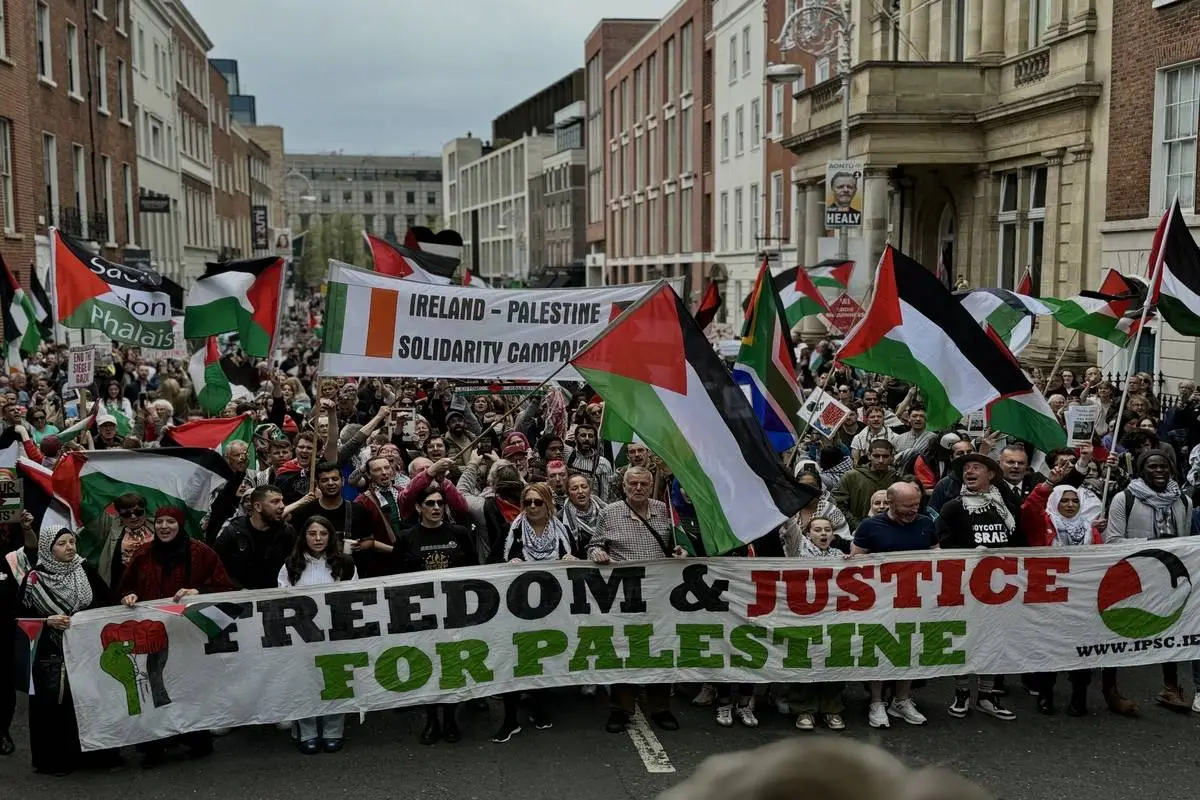
Ireland will recognise a Palestinian state, Prime Minister Simon Harris said on Wednesday, adding that he expected other countries to follow in the coming weeks after talking to world leaders.
“Today, Ireland, Norway, and Spain are announcing that we recognise the state of Palestine,” Harris said at a press conference.
“In the lead up to today’s announcement, I’ve spoken with a number of other leaders and counterparts and I’m confident that further countries will join us in taking this important step in the coming weeks,” he added.
He said a two-state solution was the only credible path to peace and security for Israel, Palestine and their peoples.
The recognition of statehood has particular resonance in Ireland given its history, Harris said.
“Taking our place on the world stage and being recognised by others as having the right to be there was a matter of the highest importance for the founders of our state,” he said.
He added that Ireland was unequivocal in fully recognising Israel and its right to exist “securely and in peace with its neighbours”, and he called for all hostages in Gaza to be immediately returned.
Ireland’s recognition of Palestine will be formally enacted on May 28, foreign minister Micheal Martin said on X.
© Reuters




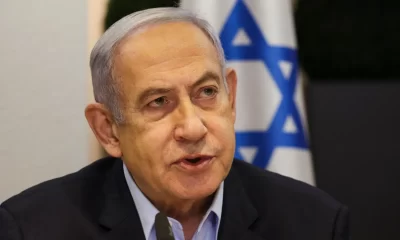

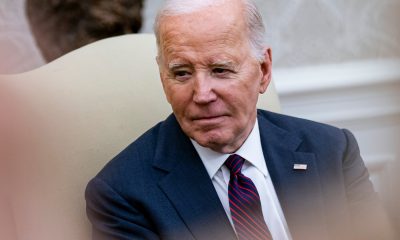

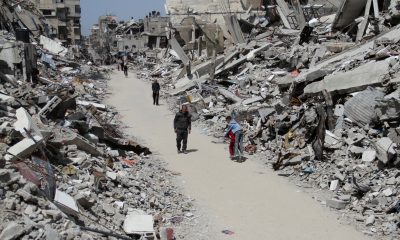

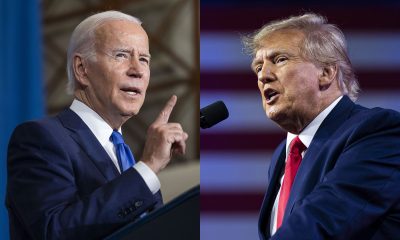








You must be logged in to post a comment Login